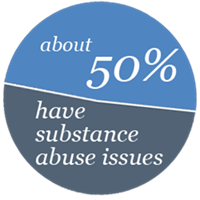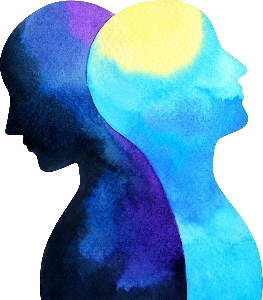Breakthroughs in Understanding Addiction Origins
Recognizing and Treating Co-occurring Disorders

 There’s an optical illusion when looking down railroad tracks. Somewhere in the distance the two rails, which we know run parallel, appear to converge into one. We know the two separate tracks cannot converge, but the illusion occurs because one’s field of view expands as the tracks appear to get smaller. In other words, the farther out into the distance we look, the more we see, and the more the smaller things appear to be one. Sometimes, it’s best to look at what’s at our own two feet before trying to figure out what is in the distance.
There’s an optical illusion when looking down railroad tracks. Somewhere in the distance the two rails, which we know run parallel, appear to converge into one. We know the two separate tracks cannot converge, but the illusion occurs because one’s field of view expands as the tracks appear to get smaller. In other words, the farther out into the distance we look, the more we see, and the more the smaller things appear to be one. Sometimes, it’s best to look at what’s at our own two feet before trying to figure out what is in the distance.
Substance use disorders are frequently driven by an underlying mental health issue.
The addiction develops as a way to contend with the pain, anxiety, guilt, shame, or trauma. These are known as “co-occurring” disorders and occur in the majority of people with substance use problems. In the past, a substance use issue was treated separately from a mental health issue. There was even the thought one needed to be clean and sober before dealing successively with other issues.
Today, we know that “co-occurring” disorders impact one other, and My Friend’s House recognizes that both the substance use issue and the mental health issue must be treated simultaneously for the outcome to be successful. Treating just one issue will not cause the other to improve – especially when one issue was born from the other - and treating only the addiction component sets an individual up for relapse after relapse.
 One of the more predominant “co-occurring” disorders is a substance use issue resulting from depression. Depression affects millions of people around the globe, and substance use develops as a way to artificially feel joy or pleasure. Unfortunately, once the euphoria wears off, the depression will only be further magnified. Anxiety is another mental health disorder in which substance use temporarily masks feelings in a social setting and suppresses the shaky feeling that anxiety can bring. Bipolar disorders, resulting from a chemical imbalance in the brain and characterized by intense feelings of mania and depression, even suicide, are frequently seen “co-occurring” with substance use issues. Post-traumatic stress disorder (PTSD), the consequence of experiencing intensely stressful and life-threatening experiences, is also seen frequently “co-occurring” with an addictive component. Many, repeat many, mental health issues can “co-occur” alongside substance use disorders.
One of the more predominant “co-occurring” disorders is a substance use issue resulting from depression. Depression affects millions of people around the globe, and substance use develops as a way to artificially feel joy or pleasure. Unfortunately, once the euphoria wears off, the depression will only be further magnified. Anxiety is another mental health disorder in which substance use temporarily masks feelings in a social setting and suppresses the shaky feeling that anxiety can bring. Bipolar disorders, resulting from a chemical imbalance in the brain and characterized by intense feelings of mania and depression, even suicide, are frequently seen “co-occurring” with substance use issues. Post-traumatic stress disorder (PTSD), the consequence of experiencing intensely stressful and life-threatening experiences, is also seen frequently “co-occurring” with an addictive component. Many, repeat many, mental health issues can “co-occur” alongside substance use disorders.
 Diagnosing “co-occurring” disorders can be difficult. Substance use can mask the symptoms of an underlying mental health issue, and symptoms of a mental health issue are frequently attributed to the consequences of substance use. It is a vicious circle, and the use of substances to ease the pain of a mental health disorder prevents one from developing necessary coping skills. Frequently, the treatment of just the substance use issue can lead to making the mental health issue worse.
Diagnosing “co-occurring” disorders can be difficult. Substance use can mask the symptoms of an underlying mental health issue, and symptoms of a mental health issue are frequently attributed to the consequences of substance use. It is a vicious circle, and the use of substances to ease the pain of a mental health disorder prevents one from developing necessary coping skills. Frequently, the treatment of just the substance use issue can lead to making the mental health issue worse.
My Friend’s House specializes in diagnosing “co-occurring” disorders and treating both simultaneously in an integrated treatment plan - in the same place, and by the same team. It is the best approach for an individual and minimizes chances of relapse due to an untreated issue. It’s the core of our ethos – saving lives one visit at a time.
So, when one looks off into the distant future and sees the railroad tracks converge, remember it is an optical illusion. The tracks are forever two separate rails and can never become one. The field of vision has become too big, and it’s best to focus on what’s immediately in front of us.






